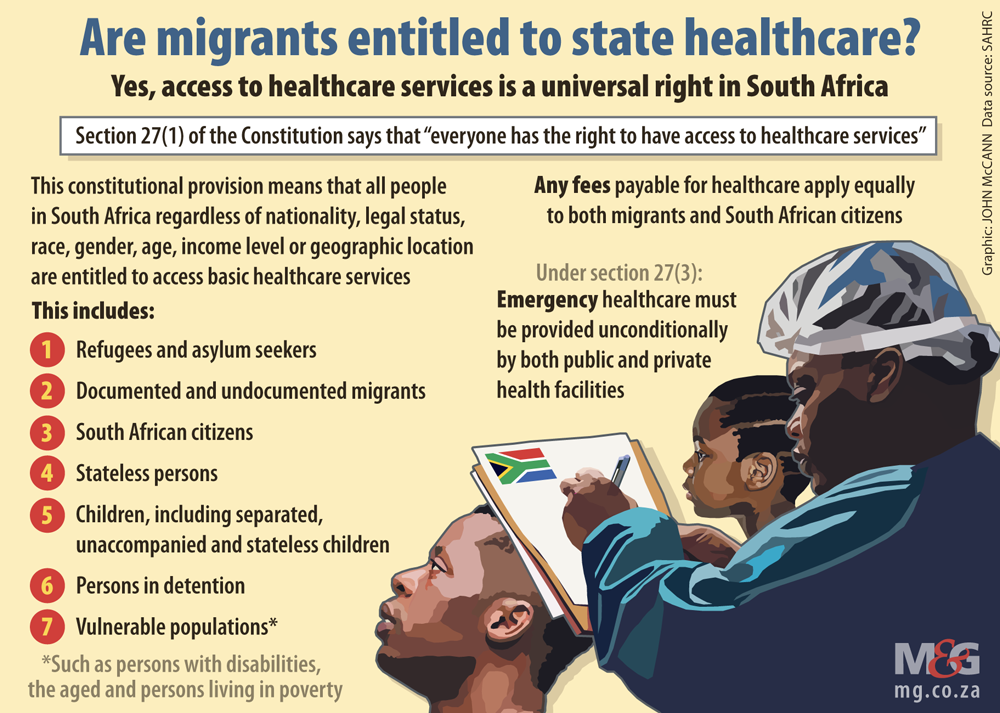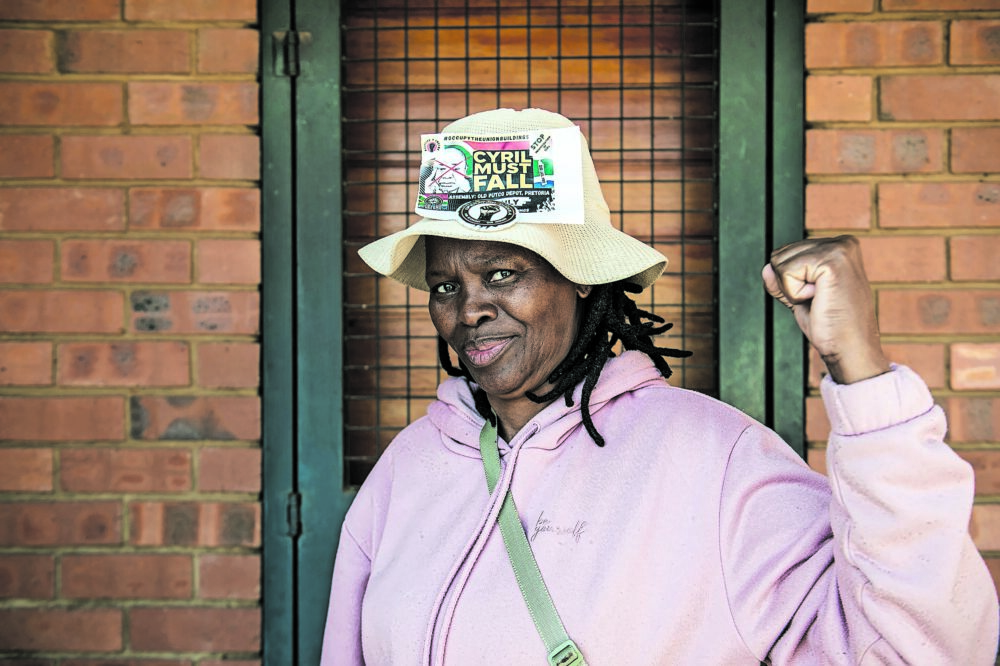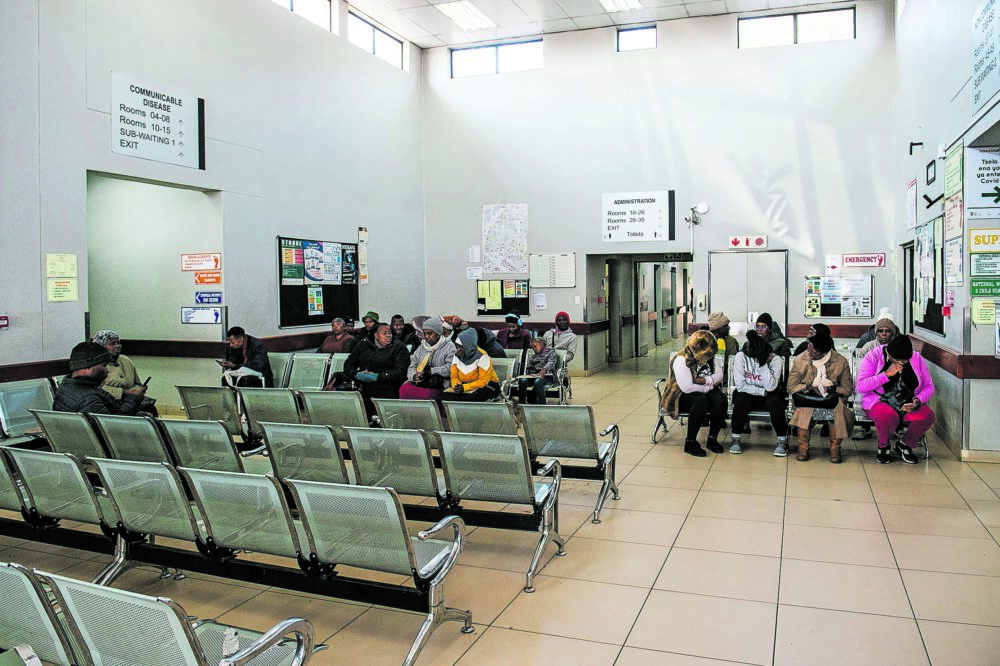Shoo, sjoe!: At the White City Clinic in Gauteng, M&G photographer Delwyn Verasamy initially was turned away for being suspected of being a Pakistani shop owner. Photos: Delwyn Verasamy
It’s been just over a week since Teresa Nortje and members of March and March started blocking undocumented foreigners from using public healthcare services at a KwaZulu-Natal hospital.
Every day, Nortje, a grade one teacher and the chairperson of the anti-immigration movement, and other members, guarded the entrance of Addington Hospital’s clinic, checking IDs. She claimed the healthcare facility was a “hotspot for foreign nationals”.
Nortje says that this controversial campaign, which calls for South Africans to be prioritised at public healthcare facilities, and is being run in concert with anti-migrant movements such as Operation Dudula, is fast gaining ground.
It’s “taking flame” at public clinics and hospitals all over South Africa, she said.
“The movement is actually working 100%. Compared to approximately 500 people going to this clinic last week, it’s come down to 200. On Sunday, I think there were four patients that actually visited the clinic and they were only South Africans,” Nortje said.
“We stopped the undocumented foreigners, even the ones with asylum papers, from entering the hospital. The amount of foreign nationals coming to this clinic is coming down. The core of the problem is that they are taking resources away from South Africans.”
She claimed undocumented migrants are “draining” public healthcare resources meant for South Africans.
“An undocumented foreigner is not paying tax so, we as taxpayers, we are now paying for them to see the doctor for free and then they get medication free of charge whereas our South African citizens, that are paying taxes and that can use these clinics, they are not getting medication.
“Everybody has the right to medical assistance, we do agree with that, but not undocumented foreigners.
“When we are in their countries and we don’t have legal documentation, we get locked up and deported … This is not a banana country where you can get everything for free.”
March and March is “not implementing xenophobia at all”, she said. “That is why we are standing here peacefully …
“The staff are immensely grateful. They say they are overworked and overwhelmed … and now they can actually breathe and take breaks.”
Nortje said that she had received death threats since the campaign unfolded but, “I’m not going to back down because I’m standing up for my country”.
The KwaZulu-Natal department of health has condemned “in the strongest possible terms”, the actions of individuals and organised groups who take the law into their own hands by targeting health facilities and obstructing access to services.
 Graphic: John McCann/M&G
Graphic: John McCann/M&G
South Africa is governed by the Constitution and the rule of law, and any grievances, no matter how serious, must be addressed through the proper legal and democratic channels, the department’s spokesperson Ntokozo Maphisa said.
“At the same time, we unequivocally condemn undocumented foreign nationals who unlawfully cross into South Africa with the sole intention of unduly accessing our public health services,” he added.
While the province’s health institutions are committed to upholding basic human rights and ethical healthcare standards, the “increasing and unauthorised influx of undocumented individuals continues to place significant pressure on our already strained and underfunded public health system”.
Maphisa said that, as much as the department is concerned about the “undue burden” placed on the system by undocumented migrants, it strongly rejects unlawful actions that prevent any sick individual from receiving medical assistance.
“No member of the public or structure has the legal or moral authority to block others from accessing healthcare. These illegal actions are not only unconstitutional but they also pose a serious risk to public health.
“Preventing individuals from entering the healthcare system undermines efforts to detect, control and treat infectious diseases that could otherwise spread rapidly within our communities.”
Blocking access to health services can inadvertently fuel uncontrolled outbreaks, including the spread of unfamiliar or imported viruses.
“Ensuring that every ill person is assessed and managed by health professionals, regardless of their nationality, is a fundamental part of South Africa’s disease prevention and public health strategy,” Maphisa said.
The department added that health facilities are not battlegrounds for political or social disputes.
 Watchful eye: Operation Dudula member Dimakatso Mokoena says the movement has been at the White City Clinic for two weeks and foreign patient attendance has dropped. Photos: Delwyn Verasamy
Watchful eye: Operation Dudula member Dimakatso Mokoena says the movement has been at the White City Clinic for two weeks and foreign patient attendance has dropped. Photos: Delwyn Verasamy
“Disrupting services endangers lives, particularly those of vulnerable South Africans in critical condition, and undermines the very essence of public healthcare delivery.”
Section 27 of the Constitution guarantees that everyone has the right to access healthcare services, including reproductive healthcare, and that no one may be refused emergency medical treatment.
The National Health Act ensures access to primary healthcare services for all individuals in South Africa, regardless of immigration status, while the Refugees Act protects the rights of refugees and asylum-seekers to healthcare services and prohibits denial of emergency medical care.
According to the Immigration Act, while healthcare facilities are permitted to inquire about legal status, this should not hinder the provision of care, especially in emergencies.
The South African Human Rights Commission and the government have condemned the blocking of foreigners from healthcare services at public facilities.
When the Mail & Guardian visited the White City Clinic in KwaThema, near Springs on Gauteng’s East Rand on Tuesday, members of Operation Dudula loosely referred to the publication’s photographer Delwyn Verasamy as a Pakistani shop owner, saying they did not allow “bo‑my‑friend” into the facility.
After learning that Verasamy is a South African citizen and a journalist, they allowed him into the clinic.
The waiting area appeared far less crowded than on previous visits, with long queues outside and some turned away because there wasn’t enough time to attend to them.
The nurses, who requested anonymity, said that since Operation Dudula’s arrival at the facility two weeks ago, patient numbers had dropped, providing some relief for the staff. Previously, one nurse would see at least 70 patients daily, but that number had now halved.
“Before, we would have more than 300 patients; now it’s half that. We work from 7.30am to 4.30pm and, in many cases, people had to go back home. The City of Ekurhuleni does not pay us for working after hours, and if we do and get injured, they will ask what we were doing after hours — so the responsibility lies solely with us,” one said.
The nurses expressed frustration working with foreigners, highlighting communication difficulties.
 White City Clinic. Photo: Delwyn Verasamy
White City Clinic. Photo: Delwyn Verasamy
“Some don’t speak any of the official languages and it becomes even more difficult to understand what they want or need.”
They were concerned about foreigners misusing passports and obtaining medication from multiple clinics. “In one instance, you’ll find them using one passport, replacing the photo but keeping the same number, and usually the passports are brand-new.
“There was a pregnant woman who delivered a baby at one of the local hospitals. Two days later, a different person showed up at the same hospital using the same passport to also deliver a baby. The nurse noticed it was the identical passport processed two days earlier — that’s the reality of what we deal with.”
They mentioned that some foreigners use random residential addresses when they register for services.
“On their way to the clinic, they pick any house nearby and use that as their address of residence. While in the queue, one patient gave the address of a neighbour of the security guard and the guard had to intervene and said the patient was lying.”
“The other issue is they go to one clinic, receive specific medications, and the next day go to another clinic for the same medication. Our systems aren’t linked, so there’s no way to track that the patient already got it.”
The nurses said that among the medications most often requested by foreigners were antiretrovirals and, because of the high demand, stock sometimes runs low.
Mandla Ndlovu, a community member and patient, said it usually took him three hours to get his monthly medication — but this week, it took just 20 minutes.
“The work done by Operation Dudula should be commended and supported by community members,” he said. “I will join them in support because it’s frustrating to come and sit at the clinic while people who are not legal in the country get priority.”
The account PSAFLIVE on X has been sharing daily videos from various clinics guarded by Operation Dudula, purporting to show how many fewer patients there were without foreigners.
The M&G visited another facility in the township, the KwaThema Community Health Centre. It was not crowded and Operation Dudula members were nowhere to be seen.
A staff member said members of the movement had approached the clinic, but senior management refused to allow them inside, saying the facility would continue serving everyone — including foreigners.
“This was about a week ago … they haven’t come back since then,” the staff member said.
Operation Dudula member Dimakatso “Commander Tiger” Mokoena said the organisation had been stationed at the White City Clinic for at least two weeks and had seen a significant decline in patient numbers since its arrival.
On the first visit, it had ordered non-South Africans to “get out” and half the people had left, Mokoena said: “This shows foreigners are using our resources — resources meant for our people. We fought for our country and they must go back home and fight their own governments.”
“We are saying as Operation Dudula that it’s about time South Africans stand up and fight for what is ours. South Africa is for South Africans; everyone must go back to their country and fix their own country as we are doing. What we are doing is trying to fix our country.”
She vowed that Operation Dudula members would camp at the clinic “for as long as it takes”, adding that residents had joined them in support because they saw it as a “noble cause”.
Undocumented foreigners are “straining the budget and straining the healthcare workers because they are overwhelmed”, Operation Dudula president Zandile Dabula said.
“Even where Dudula is not involved, communities organise themselves and go to these clinics and hospitals themselves because I think people are gatvol … They can see that there is a problem and nobody is addressing this issue.
“We’ve been at the clinics for the past two weeks but we still don’t see any immigration officer or police at these facilities to make sure that healthcare is servicing people who are documented. Or rather, if those people are undocumented and they received medical attention, they need to be handed over to the law enforcers … This means that there is just no will to deal with this matter.”
South Africans “are on their own”, she claimed. “If the people that we think are the leaders of this country are not doing anything then, unfortunately, communities will stand up and organise themselves and take over.”
Abdeslam Habiballah, chairperson of the African Diaspora Forum, is “fed up” that migrants are blamed for the country’s problems.
“Recently, a group of people in the form of a mob attacked foreign nationals who are benefiting from South Africa’s healthcare alongside South Africans,” he said.
“It is a provocative action somehow to queue with South Africans while priority is for South Africans. I saw South Africans chasing away foreign nationals from the queue.
“It is hurtful to see pregnant women returning home to give birth at a place where men and women are together in one small room.”
Among the key findings of a 2022 report by the Institute for Security Studies was that South Africa’s socio-economic problems are not caused by immigrants but by poor governance and corruption.
“Many politicians, public officials and other high-profile people regularly make anti-immigrant statements that fuel xenophobia,” the report said.
Inadequate attention was being given to implementing proactive programmes that address xenophobia.
The number of migrants in South Africa is “grossly exaggerated”. There are about 3.95 million migrants, comprising about 6.5% of the population, in line with international norms. Immigrants contribute positively to the country — about 9% of GDP — and boost employment because every working immigrant creates two local jobs.
Loren Landau, a professor of migration and development at the University of Oxford and a research professor at the African Centre for Migration & Society at the University of the Witwatersrand, said foreigners could not be blamed for problems.
“We have to start from the position that yes, there is an absolute shortage of resources for South African citizens and that they have reason to expect that they should have education, healthcare, housing, jobs etcetera. There are many reasons why they don’t have those things. Foreigners are not among them.”
Referring to “political instrumentalisation”, Landau said it was not clear what the long-term plan was for groups such as Operation Dudula and March and March. The details of “who is behind them, who is financing them, etcetera” remain murky.
“There’s clearly a political agenda there with their members … but then there is also a kind of rechannelling of people’s genuine anger and frustration. What we do see is South Africans are fed up with a lot of things with good reason. And this [xenophobia] is giving them a name for these reasons that is simple, coherent and embodied,” he said.
“There’s a lot of frustrations with everyone; with the ANC, with [former president Jacob] Zuma, with Helen Zille [chairperson of the Democratic Alliance’s Federal Council]. This [xenophobia] is intuitive — even if it’s incorrect — and it’s very powerful that an outsider has taken something that belongs to you.”
There is anger among South Africans and they don’t have a place to put it, Landau said. They have lost faith in political parties, which have no real plans to turn around the economy. “The work that we’ve done with people who are in these [anti-migrant] movements; some of them are … just playing the game. Others genuinely feel that they are fighting for what they fought for in the 1980s and 1990s, which was a fairer society where black South Africans get their due. We shouldn’t ignore that many people feel that that’s what they are genuinely doing.”
Blaming foreign nationals, however, is disingenuous.
“This is a convenient way to paper over the deep failings of education, healthcare, housing and water … These are absurd sort of fantasies but they’re simple ones that anyone can intuitively understand. Whereas if you want to go back in and look at cadre deployment, key performance areas, bad management and corruption, those are complicated stories. They don’t have the same emotional pull,” Landau said.
He noted xenophobia in the public healthcare system where people were refused treatment was not new.
“But it’s much more systemic now; it’s much more integrated between politics and institutions and it’s completely normalised … Whether it’s attacks against foreigners or anything else, when people are very angry and they don’t have an institutionalised way to channel that, that’s when violence and protests erupt.
“If I were a politician I would be quite worried.”